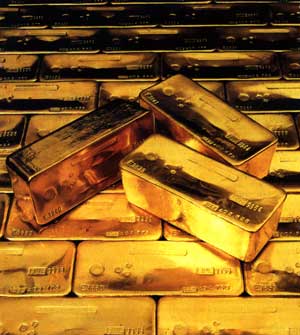
| Gold speculation ‘the germ’ of Vietnam’s financial crisis, says banker | |
Though lending to people who bet on gold is a big source of profits for many banks, the directors of a certain bank are sounding a warning. They say that punters forced to cover bad bets on gold have had a lot to do with the dong’s loss of value. Short sales & real obligations
“It was thousands of speculators making short sales and then being forced to make a real purchase of gold that was the main reason for the recent “gold fever attacks” that pushed the dong down against the dollar,” a director of the privately owned bank told a newspaper.
In ‘short selling,’ a speculator is betting that the price of gold (or any other commodity) will fall before he has to repay a loan.
The bank director explains: A client may borrow 1000 taels of gold from our bank, promising to replace it later on for 20 million dong per tael. He immediately sells the gold at the market price, and also pays interest on the loan. When the loan is due, perhaps three months later, the client has to buy gold to repay the amount he has borrowed.
If the price of the gold has in the meantime fallen to below 20 million dong per tael, the client can buy gold and return it to the bank, making a profit.
Suppose, however, that the price of gold has not gone down, as the client hoped, but instead it has gone up by several millions per tael. The client is in big trouble – he must get gold at whatever price he can, and he loses a lot of money on his ‘bet.’
On November 11, there was a panic, the bank director continued. The gold price continued increasing. Hundreds of speculators had to purchase gold at the market price to pay debts and stop losses. A lot of purchase orders were placed, pushing the gold price higher and higher, even briefly to 30 million dong per tael.
The dong-dollar and dong-gold linkage
Then the bank director explained why gold speculation leads to dollar speculation and thus affects the dong/dollar rate.
Gold does not move in and out of Vietnam freely. The Government has only allowed imports and exports of gold when it thinks that’s necessary. Meanwhile, investors still buy and sell gold regularly. Thus, there’s always demand for illegally imported gold when the internal price of gold rises above its world price. At such times, businessmen who must pay debts or stop losses try to collect dollars to buy gold, thus making the dollar price increase.
As such, the dollar price is pushed up in accordance with the demand for unauthorized gold illegal imports, while the gold price is also pushed up to ensure profit for those who arrange the imports.
When the dollar price also increases continuously on the black market, businesses and banks also become worried. Exporters, companies that get paid in dollars, are only willing to sell those dollars to banks or other buyers at the black market exchange rate. It’s useless for a bank to point to the ‘official’ rate when buying dollars from the exporters, and of course someone who wishes to buy dollars in order to finance imports must also pay the black market rate.
It’s not so hard to stop gold speculation
The November 11th gold spike is history now, but gold speculation continues. And indeed, says the bank director, lending to the speculators is the ‘rice bowl’ for some banks. Yet as long as gold speculation continues, says the bank director, the market will see ‘raging waves’.
In his view, it is not difficult to stop gold speculation. Just as the State Bank only allows banks to lend dollars to firms that have export contracts, it can instruct commercial banks to lend gold only to those who have purchased houses or land and must pay in gold according to their contracts. Banks should be prohibited from lending gold if the borrowers cannot point out how they will use such loans.
Not so long ago, when commercial banks lent gold, it was typically so people could fund their real estate purchase deals. At that time, the gold price was stable at less than five million dong per tael, and the interest rate on gold loans was very low. The number of such borrowers has decreased considerably since 2001, however, and banks have shifted their attention to lending gold to speculators. | |
| VietNamNet + TT |
